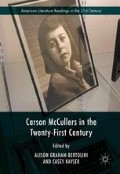Abstract
Matsui discusses how The Ballad of the Sad Café depicts a white woman’s resistance to white male dominance by being queer and penetrates the meaning of queerness in the novella. Matsui reconsiders the story’s ending, which many critics have interpreted as showing male force reinforcing a woman’s oppression, and argues that Miss Amelia’s queer way of being actually has a subversive function. Where racial, gender, and sexual categories are strictly policed by the dominant white male gaze, she crosses boundaries “diagonally.” This is opposed to a “straight” way, which means exchanging opposites, such as man for woman, or privileged for unprivileged, only to produce another form of repression. Matsui concludes that Miss Amelia’s queerness shows the possibility of alternative subjectivity beyond any boundaries or categories.
Access this chapter
Tax calculation will be finalised at checkout
Purchases are for personal use only
Works Cited
Berger, John. Ways of Seeing. London: Penguin, 1972. Print.
Carvill, Caroline. “You Might as Well Listen to the Chain Gang: The Ballad of the Sad Café.” Reflections in a Critical Eye : Essays on Carson McCullers. Ed. Jan Whitt. Lanham: UP of America, 2008. 33–45. Print.
Du Bois, W.E.B. The Souls of Black Folk. 1903. Oxford: Oxford UP, 2007. Print.
Fanon, Frantz. Black Skin, White Masks. Trans. Richard Philcox. 1952. New York: Grove P, 2008. Print.
Foucault, Michel. Discipline and Punish : The Birth of the Prison. Trans. Alan Sheridan. London: Penguin, 1977. Print.
Freud, Sigmund. “The ‘Uncanny.’” The Standard Edition of the Complete Psychological Works of Sigmund Freud. Ed. James Strachey. Vol. 17. 1955. London: Vintage, 2001. 217–56. Print.
Gilbert, Sandra M. and Susan Gubar. No Man’s Land : The Place of the Woman Writer in the Twentieth Century. Volume 1 : The War of the Words. New Haven: Yale UP, 1988. Print.
Gleeson-White, Sarah. Strange Bodies : Gender and Identity in the Novels of Carson McCullers. Tuscaloosa: U of Alabama P, 2003. Print.
Graver, Lawrence. “Carson McCullers.” University of Minnesota Pamphlets on American Writers no. 84. Minneapolis: U of Minnesota P, 1969. Print.
Jones, Anne Goodwyn. Tomorrow Is Another Day : The Woman Writer in the South, 1859–1936. Baton Rouge: Louisiana State UP, 1981. Print.
–––. “Women Writers and the Myths of Southern Womanhood.” The History of Southern Women’s Literature. Eds. Carolyn Perry and Mary Louise Weaks. Baton Rouge: Louisiana State UP, 2002. 275–89. Print.
Kahane, Claire. “The Gothic Mirror.” The (M)other Tongue : Essays in Feminist Psychoanalytic Interpretation. Eds. Shirley Nelson Garner, Claire Kahane, and Madelon Sprengnether. Ithaca: Cornell UP, 1985. 334–51. Print.
Kimmel, Michael. Manhood in America : A Cultural History. New York: Free P, 1996. Print.
McCullers, Carson. Collected Stories of Carson McCullers. Boston: Houghton, 1987. Print.
–––. The Member of the Wedding. 1946. London: Penguin, 1987. Print.
Mulvey, Laura. Visual and Other Pleasures. New York: Palgrave, 1989. Print.
Oates, Joyce Carol. On Boxing. 1987. New York: Harper, 2006. Print.
Paulson, Suzanne Morrow. “Carson McCullers’s The Ballad of the Sad Café: A Song Half Sung, Misogyny, and ‘Ganging Up.’” Critical Essays on Carson McCullers. Eds. Beverly Lyon Clark and Melvin J. Friedman. New York: Hall, 1996. 187–205. Print.
“Queer.” Online Etymology Dictionary. Ed. Douglas Harper. 2013. Web. 28 September 2013.
–––. Oxford Dictionary of Word Origins. 2nd ed. 2002. Print.
Westling, Louise. Sacred Groves and Ravaged Gardens : The Fiction of Eudora Welty, Carson McCullers, and Flannery O’Connor. Athens: U of Georgia P, 1985. Print.
Whatling, Clare. “Reading Miss Amelia: Critical Strategies in the Construction of Sex, Gender, Sexuality, the Gothic and the Grotesque.” Modernist Sexualities. Eds. Hugh Stevens and Caroline Howlett. Manchester: Manchester UP, 2000. 239–50. Print.
Wolstenholme, Susan. Gothic (Re)Visions : Writing Women as Readers. Albany: State U of New York P, 1993. Print.
Author information
Authors and Affiliations
Editor information
Editors and Affiliations
Rights and permissions
Copyright information
© 2016 The Author(s)
About this chapter
Cite this chapter
Matsui, M. (2016). Queer Eyes: Cross-Gendering, Cross-Dressing, and Cross-Racing Miss Amelia. In: Graham-Bertolini, A., Kayser, C. (eds) Carson McCullers in the Twenty-First Century. American Literature Readings in the Twenty-First Century. Palgrave Macmillan, Cham. https://doi.org/10.1007/978-3-319-40292-5_10
Download citation
DOI: https://doi.org/10.1007/978-3-319-40292-5_10
Published:
Publisher Name: Palgrave Macmillan, Cham
Print ISBN: 978-3-319-40291-8
Online ISBN: 978-3-319-40292-5
eBook Packages: Literature, Cultural and Media StudiesLiterature, Cultural and Media Studies (R0)

